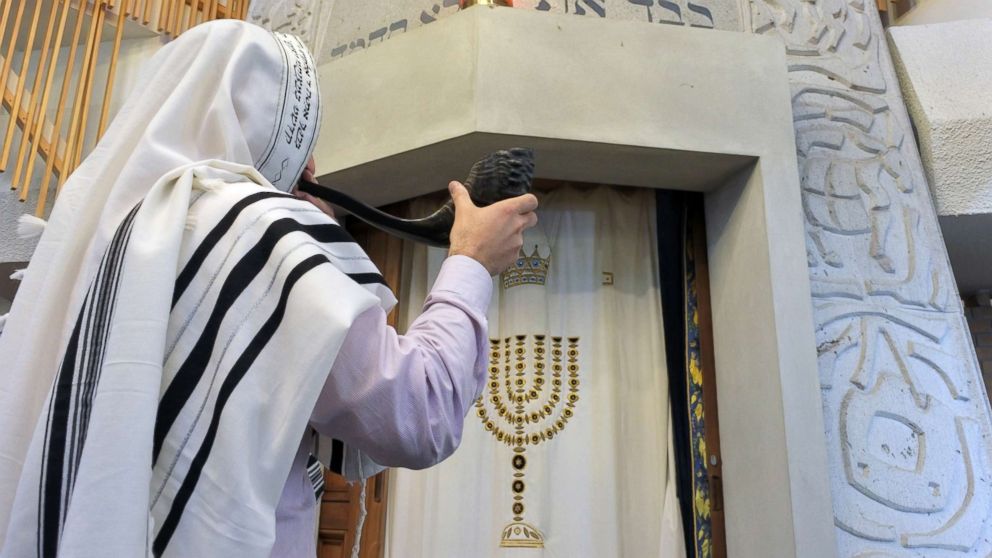During this holy day, the Jews will fast, pray, visit their synagogue, focus on their sins, national or personal, and repent of their actions against the teachings of God. Traditions include fasting, not using perfume, not having sex, and participating in prayer.
On October 9, the Jewish people celebrate the high holy day of Yom Kippur, a day of fasting that begins at night and lasts for 24 hours the following evening. On the day of Yom Kippur, all the Jewish people gathered in Jerusalem for the ordinances and prayers in the holy temple. One of the miracles of the Holy Temple was that all the men of Israel were able to sit in the four corners of the temple and worship together, bowing to the ground. Yom Kippur is a high holiday that represents faith in the one God who created the universe.
The High Holy Days began in the first two days, which were called Rosh Hashanah New Year's Day. The Ten Days of Repentance are the ten days between Rosh Hashanna and Yom Kippur. Yom Kippur is the culmination of these ten days of repentance. The purpose of repentance is to bring a materially good year for Israel to the world.
On Yom Kippur, all men wear white robes to represent holiness and purity, which is the purpose of fasting and praying on this day. The scriptures say that the Jews are on the level of angels on this day. After Yom Kippur, when God received the final forgiveness for all the sins committed during the year, now everyone has a clean slate. There is no one who is not guilty.
People try to avoid the problem of sin, divine punishment or hell.
The prayers are read several times during the sacraments, where each sin of life is separated.
The Jews gently beat their hearts and utter the words: "We have become guilty, we have betrayed, we have robbed, we have slandered, we have committed perversion, we have committed wickedness, we have committed voluntary sin, we have extorted. We made false accusations, we gave evil advice, we were deceived, we despised, we rebelled, we provoked, we deviated, we perverted, we persecuted, we persisted, we are evil, we have been corrupted, we are disgusted, we have deviated."
Then comes the request for forgiveness, which is followed by the confession of sin in prayer, which is called the "special remission of sins." This prayer is said by the Jews who gently beat their hearts and recognizes each of the many sins committed in their life. There are many categories of sins that are mentioned in the "forgiveness of sins" prayer.
In Orthodox Jewish temples, the morning prayer lasts until midnight. This is followed by the noon service and, finally, the closing prayer. There are three prayers during the week: morning, day, and evening. However, on Jewish holidays, there are five prayers on Yom Kippur, including the last prayer, when the arch of the covenant is opened for the entire length of the prayer.
Yom Kippur was the only day of the year in biblical times when the High Priest was allowed to enter a place in the holy temple called the Holy of Holies. Special sacrifices were also made in the holy temple of Yom Kippur. The prophet Moses instructed the Jewish people, including the work of the temple at Yom Kippur.
Today there is no holy temple, but the Jews celebrate the feast of Yom Kippur in the synagogues of the world. Prayer books include prayers related to temple services. Another important part of the morning service is the prayer for the ten martyrs of Israel. At the time of the destruction of the second temple, the Romans maliciously killed the ten great scholars of Israel. The names of these scientists are Ten Martyrs are mentioned in their sufferings.
On October 1973, the day of Yom Kippur, when all the Jews were fasting, praying in Israel, and in the synagogues of the world, it was reported that Israel was being attacked by a coalition of Arab states led by Egypt and Syria. The Arab Coalition unexpectedly attacked the Israeli positions, which were occupied in 1967. During the Six Day War, Egypt and Syria crossed the ceasefire to enter the Sinai Peninsula and Golan Heights. Israeli defense forces have launched a four-day counterattack in Syria. The Israeli counter attacked the Egyptian troops, crossed the Suez Canal to Egypt. On October 22, the United Nations mediated the ceasefire. Finally, on October 25, the war ended. The war had its prospects. The Arab world was humiliated, disappointed,because they had failed in their mission to destroy the state of Israel.
The last service of the Feast of Ne'ila is the hope of all mankind that war and sadness must end. All the sins of mankind must be forgiven. The light of God should shine all over the world, as the prophet Acaria says in the Prophet: "This day God will be one on the whole earth, God will be one, and his name Shalom must be one.
At the end of Ne'ila's service, Shofar's ram horn is blown, which symbolizes the words of Isaiah 27:13 prophecy: who were lost in the land of Assyria, the emigrants in the land of Egypt, will worship the Lord on the holy mountain of Jerusalem.





